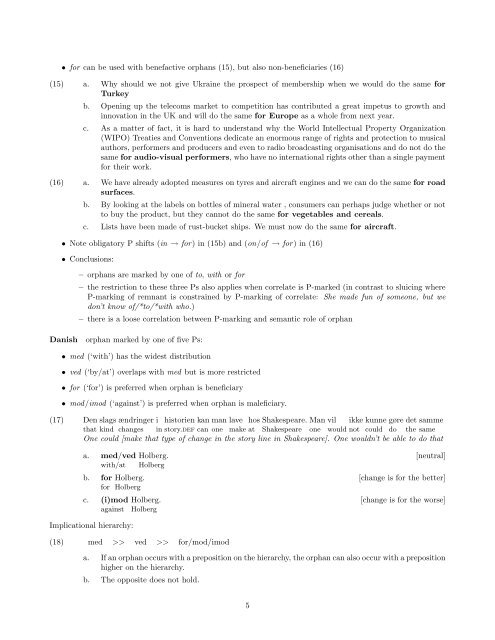handout - Linguistics
handout - Linguistics
handout - Linguistics
Create successful ePaper yourself
Turn your PDF publications into a flip-book with our unique Google optimized e-Paper software.
• for can be used with benefactive orphans (15), but also non-beneficiaries (16)<br />
(15) a. Why should we not give Ukraine the prospect of membership when we would do the same for<br />
Turkey<br />
b. Opening up the telecoms market to competition has contributed a great impetus to growth and<br />
innovation in the UK and will do the same for Europe as a whole from next year.<br />
c. As a matter of fact, it is hard to understand why the World Intellectual Property Organization<br />
(WIPO) Treaties and Conventions dedicate an enormous range of rights and protection to musical<br />
authors, performers and producers and even to radio broadcasting organisations and do not do the<br />
same for audio-visual performers, who have no international rights other than a single payment<br />
for their work.<br />
(16) a. We have already adopted measures on tyres and aircraft engines and we can do the same for road<br />
surfaces.<br />
b. By looking at the labels on bottles of mineral water , consumers can perhaps judge whether or not<br />
to buy the product, but they cannot do the same for vegetables and cereals.<br />
c. Lists have been made of rust-bucket ships. We must now do the same for aircraft.<br />
• Note obligatory P shifts (in → for) in (15b) and (on/of → for) in (16)<br />
• Conclusions:<br />
– orphans are marked by one of to, with or for<br />
– the restriction to these three Ps also applies when correlate is P-marked (in contrast to sluicing where<br />
P-marking of remnant is constrained by P-marking of correlate: She made fun of someone, but we<br />
don’t know of/*to/*with who.)<br />
– there is a loose correlation between P-marking and semantic role of orphan<br />
Danish orphan marked by one of five Ps:<br />
• med (‘with’) has the widest distribution<br />
• ved (‘by/at’) overlaps with med but is more restricted<br />
• for (‘for’) is preferred when orphan is beneficiary<br />
• mod/imod (‘against’) is preferred when orphan is maleficiary.<br />
(17) Den slags ændringer i historien kan man lave hos Shakespeare. Man vil ikke kunne gøre det samme<br />
that kind changes in story.def can one make at Shakespeare one would not could do the same<br />
One could [make that type of change in the story line in Shakespeare]. One wouldn’t be able to do that<br />
a. med/ved<br />
with/at<br />
b. for<br />
for<br />
c. (i)mod<br />
against<br />
Holberg.<br />
Holberg<br />
Implicational hierarchy:<br />
Holberg.<br />
Holberg<br />
Holberg.<br />
Holberg<br />
(18) med >> ved >> for/mod/imod<br />
[neutral]<br />
[change is for the better]<br />
[change is for the worse]<br />
a. If an orphan occurs with a preposition on the hierarchy, the orphan can also occur with a preposition<br />
higher on the hierarchy.<br />
b. The opposite does not hold.<br />
5

















